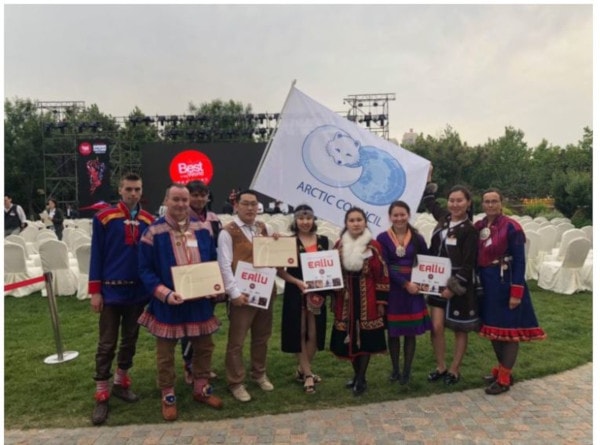Indigenous reindeer herding youth win ‘Best in the World’ at 22ndGourmand International Cookbook Award
An international group of young indigenous peoples, with their food book entitled: “EALLU –Food, Knowledge and How We Have Thrived on the Margins” has won the overall Gourmand International Cookbook Award. The winners were announced today at the “Oscars of the cookbook world” in Yantai, China. In this unique and now acclaimed food book, a team of 50 young indigenous authors presented 14 different Arctic indigenous peoples´ food cultures in one volume, the first of its kind. There were hundreds of entries from entries from across the world, the EALLU food book faced stiff competition (´eallu´means a herd (of reindeer) in the indigenous Sámi language, closely connected to the word ´eallin´ which means life), and was nominated in as many as 4 categories as well as the main prize itself –Best Food Book of the World, across all categories. The book was 1 of 16 nominees for the main prize, selected from contributions from 116 National States and was a delivery from the Arctic Council Sustainable Development Working Group project EALLU.
“To receive such an award from the mainstream food publishing industry is a powerful recognition of the richness and depth of a focal point of our cultures, our relationship to food. This is much more than just a book of recipes”, says Chair Mikhail Pogodaev of Association of World Reindeer Herders: “This is about Arctic indigenous peoples´ deep knowledge about food, raw materials, processing and conservation, food security, health and wellbeing – It’s about our food traditions, our traditional nomadic lifestyles, our local economies, our philosophy and our worldviews.
“We are incredibly proud of this achievement and our fantastic team of indigenous youth from across the Arctic who bridged generations and distance to create this unique book. Maybe this signals a shift in how mainstream society values our food knowledge and that our societies can leverage this recognition to better community physical, mental and economic health. Arctic indigenous peoples have an absolutely unique understanding of the Arctic environment, their ecosystems, and our living food resources,” says Anders Oskal, the EALLU project leader and Secretary General of the Association of World Reindeer Herders. He maintains that on the one hand this knowledge is essential for reindeer peoples to survive and thrive in the harshest natural environments on the planet. But furthermore it can also be a universal knowledge, and something the world can learn from: “For instance, the traditions of all reindeer herding peoples to utilize everything from the reindeer remains strong, and is something the world could learn from as the needs to change the global food system has become increasingly apparent”.
Editor in Chief Mr Philip Burgess (International Centre for Reindeer Husbandry), points out: “We are thrilled that the hard work of our over 50 authors from across the Arctic and sub Arctic has been rewarded with such a prestigious award. Our hope is that this award will kickstart a community led revolution in how indigenous food knowledge is used and valued. Burgess explains that a key part of the EALLU project is to document and bring forth traditional indigenous knowledge related to food, knowledge that is little documented and that in some instances is now being lost.
The Arctic region is now undergoing rapid and historical changes, driven by climate change, increasing human activity, biodiversity change and socio-economic changes. An aim of the EALLU project is to also focus on the opportunities arising from global change. Young Evenki reindeer herder and co-author Alena Gerasimova from Eastern Siberia explains: “We wished to explore if we could have another type of development, based on our own knowledge, our own perspectives, and our own people – how we could build our own economies on our own premises – and we found an answer in our own traditional food culture”.
The book is a product of an Arctic Council project entitled EALLU: Indigenous Youth, Arctic Change and Food Culture. The project is initiated and led by the Association of World Reindeer Herders (the circumpolar NGO for all 24 indigenous reindeer herding peoples), in close partnership with 5 Arctic States and the 6 indigenous organizations of the Arctic Council. The book was presented in person to all Ministers of Foreign Affairs of the Arctic States during the Arctic Council Ministerial Meeting in Fairbanks, Alaska May 11, 2017.
Source:reindeerherding.org - Philip Burgess

